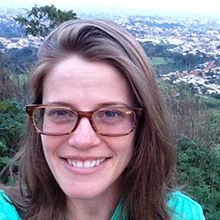Anthropology’s Alli Harnish Seeks Answer to Her Lewis Cass Question
Related Posts
Connect With Us
February 10, 2017
By Chuck Carlson
Albion College anthropology professor Alli Harnish has a question. And she really wants an answer.

Alli Harnish is a cultural anthropologist specializing in rural livelihoods, international development, and human-environment relations. She earned a Ph.D. in anthropology as well as a graduate certificate in gender and women’s studies from the University of Kentucky after completing a B.A. in anthropology and sociology at Western Kentucky University.
“I moved here in 2013 and I saw all these signs around the state with the name Cass,” she said.
And then she began to list them off in rapid succession.
It starts with Cass County and continues with the town of Cassopolis as well as the Cass River and Cass Lake. In Detroit there’s Cass Avenue, the Cass Corridor, Cass Park, and the Lewis Cass Technical High School. There’s Cass Cliff on Mackinac Island and the Lewis Cass Building in Lansing. There are Cass Avenues in Bay City and Grand Rapids. And then there’s Cass Street in Battle Creek, Kalamazoo, Traverse City and right here in Albion. There are, no doubt many other places Harnish hasn’t had time to locate.
“I began to think, ‘What’s with all the Cass stuff?'” Harnish said.
It’s a question she asks not just out of burning curiosity but, as a cultural anthropologist, the honoring of Lewis Cass doesn’t sit well with her.
Lewis Cass was indeed a pivotal figure in the early history of both Michigan and the United States. He was a Brigadier General in the War of 1812 and served as Michigan’s territorial governor from 1813-31. From 1831-36 he served as Secretary of War under President Andrew Jackson; he was minister to France, twice a U.S. senator representing Michigan (1845-48, 1849-57), Secretary of State under President James Buchanan (1857-60), and twice an unsuccessful candidate for president.
But Harnish said there was a darker side of Cass that she believes many state residents don’t know.
As Secretary of War, Cass implemented the Indian Removal Act and oversaw the coerced migration of tens of thousands of Native Americans from their ancestral homelands in the Southeast to territories west of the Mississippi River. Some four thousand Cherokee died on the Trail of Tears from starvation, exposure, and disease.
As a senator, Cass supported the Doctrine of Popular Sovereignty, which suggested that American settlers living in western territories should get to vote on whether or not to allow slavery. This idea inspired a rush by pro- and anti-slavery settlers to migrate to Kansas in order to sway the vote. The violence and intimidation that ensued, known as Bleeding Kansas, pushed the nation toward civil war. Of course we can see the doctrine of popular sovereignty today as a failed compromise strategy. But at its core that strategy was racist—it was empowering one group of people with the decision of whether or not they should be allowed to own and exploit another group of people.
So recently, she sent that question to WDET, Detroit’s public radio station, as part of its investigative program about state history known as CuriosiD.
Her question focused on the large number of places in Michigan bearing the name Cass and whether there have ever been requests to change those names due to Cass’s history.
“If not, why? What honorable deeds did Cass perform to deserve such recognition? Who are his defenders? And, which of his acts as a statesman outweighs the crushing bigotry of his two most famous ideas?” she said in her question the station.
The question intrigued the station and it is one of three questions now being voted on by listeners. The other two are about the salt mines under Detroit and how Detroit became the biggest Muslim community in the Western Hemisphere.
The question that garners the most votes will be researched by the station and the answer will be presented in a few weeks.
Harnish said that whether her question is selected or not, it has provided a way for her Native North America class to engage in the topic. This semester, her students will be investigating the history of local place names, researching the history of Michigan’s 12 federally recognized tribes, and thinking critically about whose stories get told and why.
As senior anthropology student Sydney Roeder, ’17, noted, “Perhaps one day, Albion students on their way to the Ludington Center will walk down a street named for one of the many influential Native Americans that have lived and live in the state of Michigan.”
Ultimately, Harnish hopes her question can start a dialogue around the state about settler colonialism, structural inequality, and the significance of naming.
Want to vote? Go online to http://wdet.org/series/curiosid/. Check out WDET on Facebook and Twitter as well.